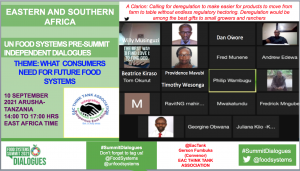Comentarios oficiales del Diálogo para la Cumbre de las Naciones Unidas sobre los Sistemas Alimentarios de 2021
Última actualización:
Descargar PDFTipo de diálogo
Independiente
Convocado por
1. Mr. Gerson Fumbuka (East African Community Think Tank Association); 2. Mr. Timothy Wesonga (East African Community Think Tank Association)
Idioma del Diálogo
ENGLISH
Fecha/hora
De:
Para:
Para:
Ciudad
JPR5+M76, Arusha, Tanzania
Enfoque geográfico
No borders
Formato
Virtual
Por favor revise los detalles que encontrará más abajo para obtener información sobre cómo registrarse en el caso de que esté disponible o contacte al convocante si le gustaría asistir.
Administrador
1. Ms. Beatrice Kiraso (East African Community Think Tank Association); 2. Mr. Philip Wambugu (East African Community Think Tank Association);
Descripción
Theme: What Eastern and Southern Africans Consumers need for the future food systems.
The problems of agriculture and food production in Eastern and Southern Africa have been there for a longtime. These problems have been brought about partly by the ensuing food systems in these parts of Africa. In these regions, farmers and consumers are disconnected. The distance between food production to the consumers’ table is getting longer. Consumers are not sure where the foods come from nor by whom their foods are grown. In order to solve these problems, the transition from the global food system to a local food system is imperative. In a local food system, farmers and consumers are connected and they can help each other through easier flow of information.
The global challenges of current food systems are fairly well known, including intensification of farming systems, leading to significant erosion of ecosystems, soil quality and biodiversity. As a result, roughly 850 million people have been rendered food insecure. Food waste is high in the farms, storage, retail and consumers kitchens. Diets in many countries are moving towards high a proportion of livestock products due to reduced number of crops as a result of dwindling genetic diversity. Add to this climate change and water scarcity.
It means the need for change towards more sustainable and equitable food systems, greater collaboration between different sectors and stakeholders will be key. Their collaboration will strengthen consumer protection, the right to adequate food, securing better nutrition, better production, better environment and better lives, leaving no-one behind.
Agradecimiento
(1) Dr. Peter Mututu Mathuki (Secretary General-East African Community); (2) Amb. Francis Muthaura - Former Secretary General EAC; (3) Hon. Amanya Mushega -Former Secretary General EAC; (4) Amb. Dr. Juma Volter Mwapachu - Former Secretary General EAC; (5) Amb. Dr. Richard Sezibera- Former Secretary General EAC; (6) Amb. Liberat Mfumukeko- Former Secretary General EAC; (7) Dr. Kipyego Cheluget - Deputy Executive COMESA; (8) Dr. Caleb Weggoro - Chairman of the Bank of Africa (TZ) and Former Executive Director AfDB; (9) Mr. Peter Kiguta - Former EAC Director General (Customs and Trade); (10) Hon. Jesica Eriyo - Board Member for the Conservation of Nature; (11) Mr. Wilbert Kaahwa - Former EAC Counsel to the Community; (12) Mr. Aloyce Mutabingwa - Former EAC Deputy Secretary General.


Créditos de la imagen: East African Community Think Tank Association
